In the digital age of remote work and information privacy, the way you manage your physical mail has become a big decision.
Understanding the differences between virtual address vs PO box is crucial for businesses looking to establish a strong presence in the market or even individuals who would like a greater level of privacy. In this article, we’ll explore the benefits and drawbacks of both options, helping you make an informed decision that best suits your needs.
Short Summary
To start, let’s take a deeper dive into each of these services.
Understanding Virtual Addresses and PO Boxes
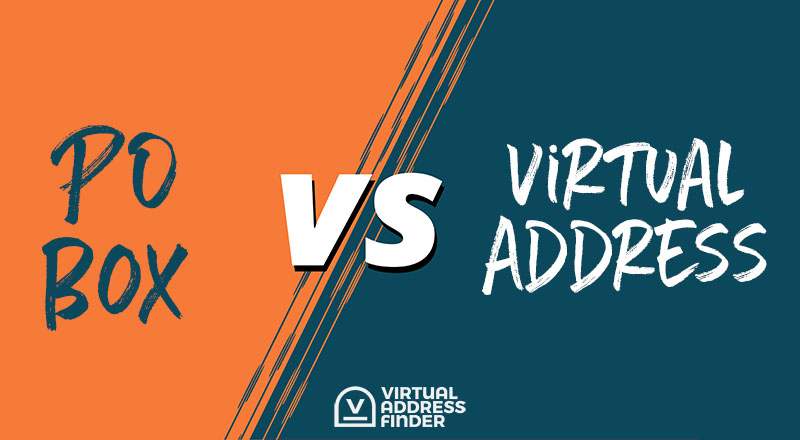
When it comes to mail delivery services, the two most popular options are virtual addresses and PO boxes.
- Virtual Address: a service that provides a physical address for use in lieu of a residential or business address where mail is usually handled virtually.
- PO Box: a general delivery facility provided by the postal service where mail is usually picked up in-person. Here a guide for how to get a PO Box if you need it.
Both options have their own set of advantages and disadvantages, which we will explore in detail below. By the end, you should have a clearer understanding of which option best suits your business requirements or personal needs.
What is a Virtual Address?
A virtual address is a service that provides a physical address for use in lieu of a residential or business address. This means that you can have a prestigious address for your business without actually having a physical office space at that location.
When mail is received at the virtual address, it gets processed, sorted, and scanned. Users can then view their mail online and make decisions regarding its disposal, such as shredding or forwarding it to another address.
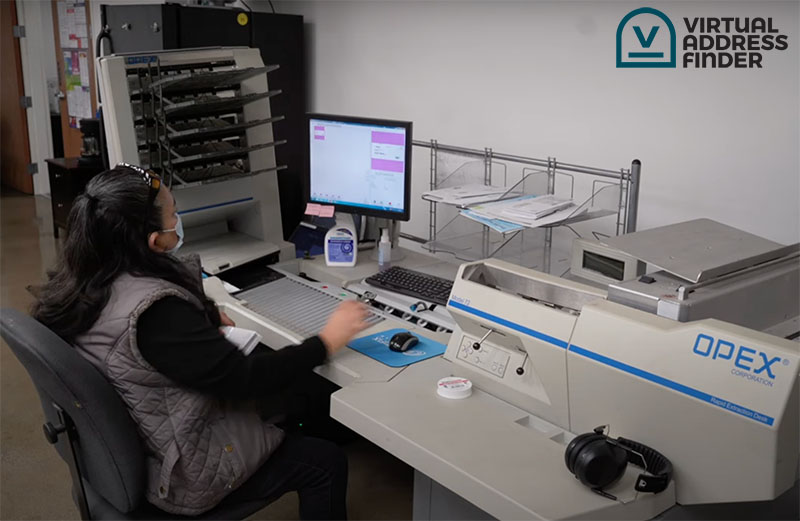
One of the primary advantages of a virtual address is the range of benefits it offers, including:
- Prestigious address
- Automated mail services
- Professional image
- Remote mail management
- Supplementary services
- Flexibility & scalability
The cost of a virtual address varies depending on the plan selected, with prices typically starting from $9.99. The biggest concern with virtual addresses for most businesses is security, which we’ll talk about more below.
What is a PO Box?
A PO box, or post office box, is a service provided by the postal service that enables individuals to receive mail at an alternate address from their residence or place of business.
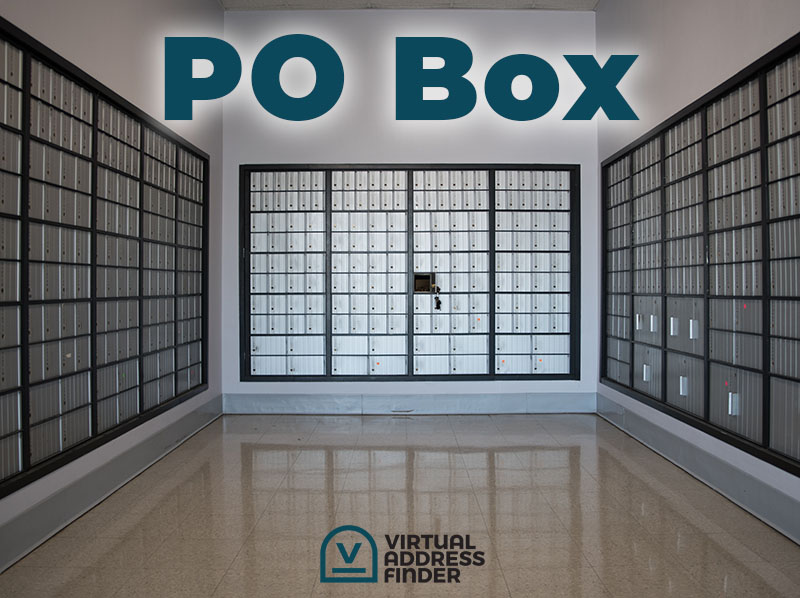
This can be a convenient way to add a separate mailing address, but it is important to note that a PO box is not suitable for official purposes, such as signing contracts or setting up a registered business address.
While PO boxes provide a basic solution for receiving mail, they lack many of the additional features and benefits offered by virtual addresses. In the following sections, we’ll delve deeper into the advantages of virtual addresses over PO boxes and the limitations of PO boxes that make virtual addresses a more attractive option for many businesses.
Advantages of Virtual Addresses over PO Boxes
Virtual addresses offer numerous advantages over PO boxes, including an enhanced professional image, remote mail management, additional services and amenities, and flexibility and scalability. These benefits make virtual addresses a more attractive option for businesses looking to establish a strong presence in today’s competitive market.
In the following subsections, we’ll explore each of these advantages in greater detail.
Enhanced Professional Image

For businesses, a virtual mailbox offers a more professional image than a PO box, as it provides a physical address that can be used for a business that allows for flexible and remote working while still having a physical business presence.
Clients tend to have greater trust in a professional-looking address (that they can look up on Google Street View) as opposed to a home address or a PO box, which can help establish credibility and authority for your business.
Moreover, a virtual address provides increased privacy by keeping your home address separate from your business dealings. Additionally, virtual offices offer businesses a cost-saving benefit, as they eliminate the need for a physical office space if you and your workforce are remote.
Remote Mail Management
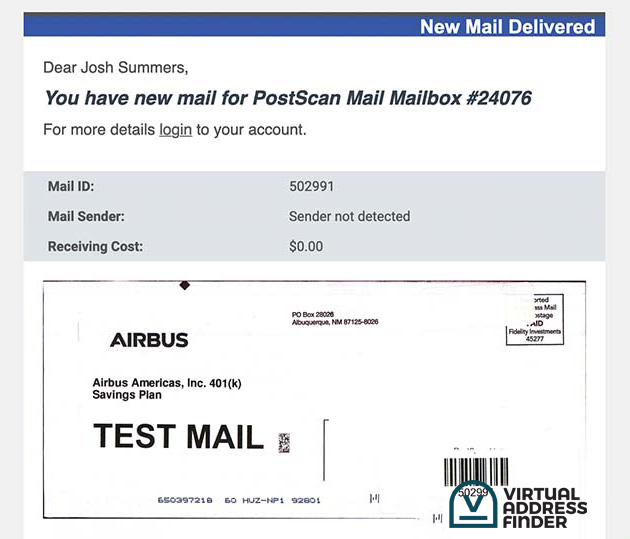
One of the major advantages of using a virtual address is the ability to manage your mail remotely: handle mail from anywhere, at any time, on any device.
This is particularly useful for businesses with a mobile workforce or for entrepreneurs who frequently travel (or are digital nomads!).
A virtual mailbox allows you to view a scanned image of the mail and packages, forward, scan, schedule a pickup, and discard mail items. This comprehensive approach to mail management can significantly reduce the time spent on record-keeping while providing a complete overview of all your mail in a single location.
While post offices are beginning to offer this kind of remote management to PO Boxes, it’s not very common and it’s not always implemented well.
Additional Services and Amenities
Virtual addresses provide a range of additional services that PO boxes simply do not offer. For instance, depending on the virtual mailboxe service you use, they may provide:
These additional services not only make managing your mail more convenient, but also contribute to the overall professional image of your business. A virtual address can give your business the edge it needs to stand out in today’s competitive market.
Flexibility and Scalability
The flexibility and scalability offered by virtual addresses are particularly beneficial for businesses experiencing growth or anticipating future expansion. Virtual addresses allow businesses to select an address that is most suitable for their needs and can adjust addresses without having to relocate completely.
Moreover, businesses and individuals can register for multiple virtual addresses and manage them with a single account.
The PO Box model simply can’t compare to this kind of flexibility and scalability, which allow you to adapt to changing needs either from your business or your personal situation.
Limitations of PO Boxes
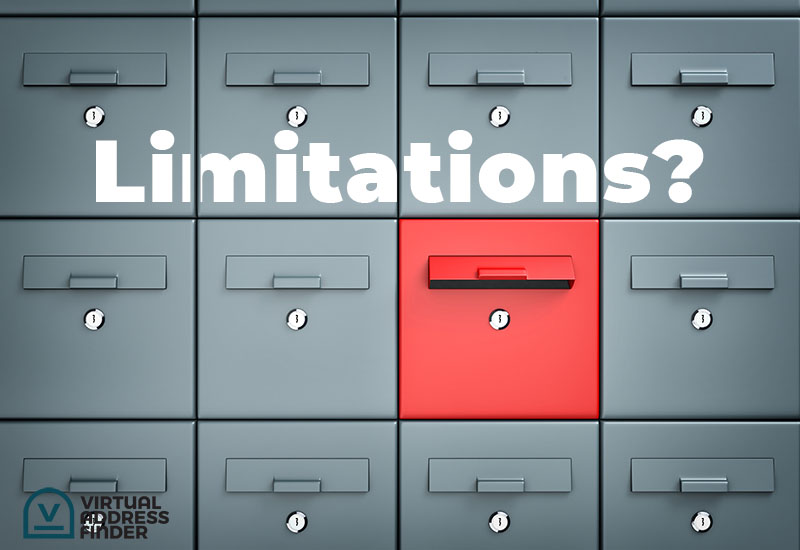
While PO boxes offer a basic solution for receiving mail, they come with several limitations that can impact what you’re able to do either from a business or personal perspective.
Let’s take a moment to discuss the restricted access, shipping restrictions, and lack of professionalism associated with PO boxes.
Restricted Access
Restricted access is one of the primary drawbacks of utilizing a PO box. Only the individual possessing the key to the PO box can access the mail, making it difficult for companies that receive a large volume of mail to keep up with their correspondence.
This limited access can be an obstacle for companies that require a more comprehensive mail management solution.
In contrast, virtual addresses provide unlimited access to your mail and can be checked from multiple team or family members, regardless of location.
Shipping Restrictions
Another well-documented limitation of PO boxes is their shipping restrictions. The United States Postal Service (USPS) will only accept packages that are lightweight (under 70 pounds) and can fit in the box.
Furthermore, PO boxes are unable to accept incoming mail or packages from competing companies, such as FedEx, UPS, and Amazon.
That’s a BIG DEAL!
Virtual mailboxes, on the other hand, are not subject to any shipping restrictions and accept mail from any origin. This makes virtual addresses a more versatile and convenient option for businesses or individuals that require reliable and comprehensive mail and package delivery services.
Lack of Professionalism
Finally, the use of a PO box can lead to a lack of professionalism compared to a virtual address. PO boxes lack a tangible physical address, which can impede credibility and authority for your business.
People tend to have more confidence in a professional-looking address than in one associated with a home-based business or a PO box.
By providing a legitimate address for use in business documentation, websites, and other online directories, virtual mailboxes help create a more professional impression to customers, partners, and other businesses.
Choosing the Right Option for Your Business
As we’ve explored throughout this blog post, both virtual addresses and PO boxes have their own benefits and drawbacks. Ultimately, the decision between the two will depend on the particular needs and preferences of your business.
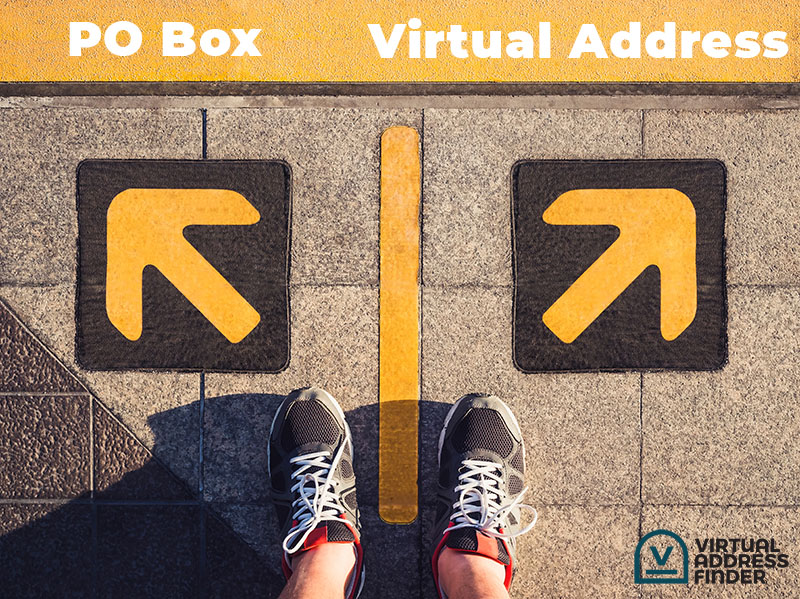
To finish things up, let’s look through some factors to consider when choosing between a virtual address and a PO box, such as cost, business requirements, and security.
Cost Considerations
The cost of a virtual address and a PO box may vary depending on the provider and the services offered. The cost of a virtual address typically ranges from $9.95 to $35 per month, depending on the provider. On the other hand, the cost of a PO box typically ranges from $10 to $50 annually.
While a virtual address is generally more expensive than a PO box, it offers a wider range of features and services that can justify the additional expense. When evaluating the cost of each option, it’s important to consider not only the initial expense but also the potential long-term benefits to your business.
A virtual address may be a more cost-effective solution in the long run if it provides your business with a more professional image, improved mail management, and additional services that can support your growth.
Business Requirements
When selecting between a virtual address and a PO box, you need to consider your business requirements for mail and package delivery, customer service, and scalability. A virtual address may be more convenient and create a more professional impression for your business, whereas a PO box may be more secure and may be compulsory for certain business registrations.
Take into account the needs of your business and the types of mail and packages you expect to receive. If you need a physical street address to receive mail from all mailing providers or if having a prestigious business address is important for your professional image, a virtual address may be the better choice. On the other hand, if security and cost are your primary concerns, a PO box may be more suitable.
Mail Security
Finally, the security of your mail is no small matter, which makes it important to consider who handles your mail and how it is handled.
For PO Boxes, the post office takes responsibility for the mail you receive and is generally considered to be trustworthy.
Virtual address companies aren’t subject to the same security requirements and often tend to outsource their addresses to mom-and-pop mail shops. While there’s nothing illegal about this, you need to pay close attention to how your mail is handled and be sure that you’re choosing the best virtual address company that deserves that level of trust.
Summary
In conclusion, understanding the differences between virtual addresses and PO boxes is critical for businesses looking to establish a strong presence. Virtual addresses offer numerous advantages, including an enhanced professional image, remote mail management, additional services and amenities, and flexibility and scalability.
On the other hand, PO boxes come with several limitations, such as restricted access, shipping restrictions, and a lack of professionalism.
By carefully considering factors such as cost, business requirements, and mail security, you can make an informed decision that best suits your business needs.
Frequently Asked Questions
It depends. A PO Box gives you the ability to accept and manage your mail, but it doesn’t work as a registered address for a business. Also, a PO Box is limited in the kind of mail it can receive, which among many other features makes a dedicated virtual address appealing.
A dedicated virtual mailbox service is able to receive any kind of package on your behalf. A PO Box, on the other hand, is limited to only receiving USPS packages. With a virtual mailbox, your incoming mail gets sorted and scanned, and you receive a digital copy to access 24/7 from any device, anywhere.
Yes, virtual mailboxes are legal and are officially recognized by the postal service to receive and manage your mail. These mailboxes are registered with the USPS as Commercial Mail Receiving Agencies (CMRA) and can provide a range of services, from mail forwarding to package notifications.
Using a virtual address is beneficial for businesses and individuals as it helps protect privacy, provide credibility, eliminate the need for office space and can go wherever the business moves. Virtual addresses make managing mail easier by instantly creating a digital copy of everything that arrives and allowing you to organize important pieces.

Josh Summers is a writer and entrepreneur who has been using a virtual mailbox for both personal and business use while living in Asia for the past 10 years. In addition to using multiple services, he has actually visited a number of virtual address locations to better understand how the industry works and what’s most important to consider.
